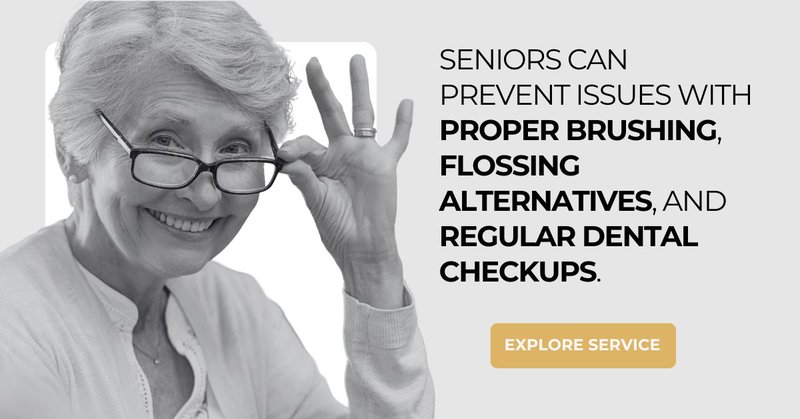Oral hygiene for seniors becomes even more important as you get older. Seniors face unique dental challenges like gum disease, tooth loss, and dry mouth, which can affect overall health. There is good news, though. With the right care, maintaining a healthy smile is possible. There are common issues that come up with oral hygiene for seniors. Taking practical steps to improve oral health and prevent problems will keep your smile strong for years to come.
Key Takeaways:
- Common Senior Dental Issues: Tooth loss, gum disease, and dry mouth can lead to infections as well as other health problems.
- Aging & Dental Health: Enamel wears down, gums recede, and saliva production decreases which increases cavity and decay risks.
- Tooth Loss Causes: Primarily due to gum disease, poor hygiene, smoking, and conditions such as diabetes.
- Gum Disease Effects: Leads to bone loss, loose teeth, and links to heart disease and diabetes.
- Oral Hygiene: Electric toothbrushes help with mobility issues. Water flossers and interdental brushes are good flossing alternatives.
- Dry Mouth: Caused by medications, diabetes, and other health issues, increasing cavity and gum disease risks.
- Diet & Oral Health: Dairy, leafy greens, as well as crunchy vegetables promote healthy teeth. Sugary and acidic foods should be limited.
- Affordable Dental Care: Dental schools, community clinics, and discount dental plans offer low-cost treatments. Medicare covers only medically necessary dental procedures.
- Dentures & Oral Health: Ill-fitting dentures can cause sores and bone loss. Proper cleaning prevents infections.
- Regular Checkups: Seniors should visit the dentist twice a year to catch and prevent serious issues early.

The Most Common Oral Hygiene Issues for Seniors
Aging brings changes to oral hygiene for seniors that can lead to serious dental problems. Many seniors face tooth loss, gum disease, and dry mouth. This makes eating and speaking more difficult. These issues can also increase the risk of infections as well as overall health problems. Addressing these challenges can help maintain a healthy smile.
How Aging Impacts Dental Health
Teeth and gums change with age. The enamel on teeth wears down, making them more sensitive. Gums may recede and expose the roots, The roots lack the protective enamel. This leads to a higher risk of cavities and root decay. Saliva production can also decrease which causes dry mouth making it easier for bacteria to grow.
The Primary Causes of Tooth Loss in Seniors
Gum disease is the top issue with oral hygiene for seniors. Poor oral hygiene, smoking, and certain health conditions like diabetes weaken the gums and bones supporting the teeth. Cavities in older adults also play a role, especially when they develop near the roots. Without proper care, these problems can lead to tooth loss.
How Gum Disease Affects Older Adults
Gum disease starts with plaque buildup, leading to swollen and bleeding gums. If untreated, it can cause infection, bone loss, as well as loose teeth. This condition is linked to heart disease and diabetes, which makes it a serious concern. Regular brushing, flossing, and dental checkups can help prevent gum disease and keep gums healthy.
For more tips on protecting your smile, check out the Smile Dailey website. Seniors can also find helpful resources on oral hygiene for seniors from the National Institute of Dental and Craniofacial Research.
How Seniors Can Maintain a Proper Oral Hygiene Routine
The Best Brushing Techniques for Seniors with Mobility Issues
Using an electric toothbrush helps seniors with mobility issues clean their teeth more effectively. It requires less effort and reaches more areas than a manual toothbrush. A soft-bristled brush is also important to protect gums. Toothbrushes with larger handles or grips can make holding the brush easier for those with arthritis. Seniors should brush for two minutes twice a day using small, circular motions. Brushing at a 45-degree angle to the gums also helps remove plaque.
Flossing Alternatives Exist for Seniors with Dexterity Challenges
A water flosser is a helpful alternative to traditional floss for seniors with dexterity challenges. Water flossers use a stream of water to remove plaque and food particles. Another option is interdental brushes which clean between teeth. Floss picks with built-in handles can be easier to use than regular floss. If flossing is difficult, using a mouthwash helps reduce bacteria.
Recommended Products for Oral Hygiene for Seniors
Seniors should use fluoride toothpaste to strengthen enamel and prevent decay. Alcohol-free mouthwash helps with dry mouth as well as gum health. For those with sensitive teeth, desensitizing toothpaste can reduce discomfort. If holding a toothbrush is difficult, a toothbrush with a larger handle or an adaptive grip can make brushing easier. Having a proper denture cleaner is essential for those with dentures. For dry mouth, sipping water often or using saliva substitutes helps maintain moisture. More information about dry mouth solutions can be found here.
Why Dry Mouth Is a Concern for Seniors
Causes of Dry Mouth in Older Adults
Dry mouth happens when the body does not produce enough saliva. Aging itself does not cause it, but common medications and health issues do. Many seniors take medicines for various issues that reduce saliva production. Health conditions like diabetes, Parkinson’s, or a stroke can also be factors. Cancer treatments such as radiation or chemotherapy may worsen dryness by affecting the saliva glands.
How Reduced Saliva Impacts Oral Hygiene for Seniors
Saliva protects teeth and gums by washing away food and bacteria. Without enough saliva, bacteria build up quickly. This leads to cavities and gum disease. It also makes chewing, swallowing, as well as enjoying food more difficult. Seniors with dry mouth may also struggle with dentures. Saliva helps keep them in place. A lack of moisture can also cause cracked lips, mouth sores, and a burning sensation on the tongue.
Effective Ways to Manage and Prevent Dry Mouth
Drinking water regularly keeps the mouth moist. Chewing sugar-free gum or sucking on sugar-free lozenges also helps stimulate saliva flow. Seniors should cut back on caffeine, alcohol, and tobacco, as these dry out the mouth. Using a humidifier at night adds moisture to the air which helps with dryness while sleeping. Some over-the-counter sprays and rinses also provide hydration. If medications are the cause, a doctor may adjust the dosage or recommend an alternative. For more information on treatments for dry mouth, check out WebMD's guide.
What Role Diet Plays in Oral Hygiene for Seniors
A well-balanced diet helps maintain strong teeth and gums. The right foods supply essential nutrients that fight infections, support healing, and also reduce cavity risk. Some foods promote oral health, on the other hand, others contribute to decay and gum disease.
Foods That Promote Strong Teeth and Gums
Foods rich in calcium, vitamin D, and phosphorus help keep teeth and gums healthy. Dairy products like milk, cheese, as well as yogurt provide calcium for strong enamel. Leafy greens contain calcium and folic acid which benefit gum health. Fatty fish like are excellent sources of vitamin D which helps absorb calcium. Other good options include nuts, eggs, and beans for essential nutrients.
Crunchy fruits and vegetables such as apples, carrots, and celery naturally help clean teeth and increase saliva production. High-fiber foods, like whole grains and legumes, also stimulate saliva flow and promote gum health.
Foods Seniors Should Limit for Better Dental Health
Sugary and acidic foods contribute to dental problems. Candy, soda, as well as pastries feed bacteria leading to cavities and gum disease. Sticky foods like dried fruit and caramel cling to teeth and are hard to clean. Citrus fruits, tomatoes, and vinegar-based foods can weaken enamel due to acidity. Processed foods lacking nutrients may also increase inflammation in the mouth. Seniors can reduce risks by rinsing with water and brushing after eating these foods.
Prioritize Your Oral Health with Smile Dailey Dental
Aging affects oral hygiene for seniors in many ways. Affordable dental care options exist even without insurance. A healthy diet, as well as staying hydrated, is vital to keeping strong teeth and gums. Prioritizing oral health leads to fewer issues in the future. Regular dental visits are crucial for preventing problems down the road.
To schedule an appointment with Smile Dailey Dental, visit our website and request an appointment. You can also reach us via telephone or email.

